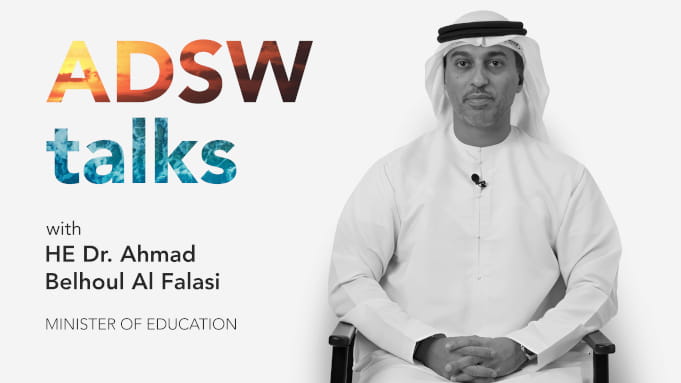Opening Ceremony lays the foundation for cross-sector collaboration and breakthrough solutions.
UAE’s drive to establish ‘green certified’ schools will instill sustainability within younger generation, says country’s Minister of Education on ADSW Talks
Teaching the next generation about sustainability at an early age will help protect the planet’s future, says Dr Ahmad Belhoul Al Falasi on ADSW Talks.
With the global population forecast to reach 10 billion by 2050, it is vital that young people are equipped to drive the energy transition and lead sustainable lifestyles, he adds.
“We need to work on our students today because they will be the ones making the future 20 years from now,” says Dr Al Falasi.
“We are integrating sustainable behaviors at a very early stage to really make students aware of the impact that each of them has on their lives and on the globe.”
This is done inside and outside the classroom, he adds. For instance, students are encouraged to conduct experiments to help them appreciate the importance of sustainability.
Describing the UAE’s ‘Green Education Partnership’, Dr Al Falasi talks about four pillars, including ‘greening’ schools so they reduce their carbon footprints and train teachers to impart sustainability knowledge and encourage environmentally friendly practices.
“We want our schools to become anchors within the communities,” he says.
He adds that the UAE has targets for half of all schools to be ‘green certified’ and to train 2,800 educators and 1,400 school principals. The plan also involves supporting 70 students and teachers to spread the sustainability message globally.
The UN climate change conference COP28, to be hosted in the UAE in November and December, will be the first COP to have an ‘Education Pavilion’. Dr Al Falasi hopes this development will leave a positive legacy.
“We truly believe that a platform is required to convene educators, students, experts, policymakers, and government officials to really work together and integrate sustainability into education,” he says. “This will be a first, but we hope that this will be a consistent theme in all COPs going forward.”
He also shares his dream for future generations to live sustainably, following in their ancestors’ footsteps.
“My wish is that in years from now, my grandchildren and their grandchildren will live a very comfortable life and will go back to our DNA in the UAE,” he says. “We’ve always lived a sustainable life. I would love for us in the future to go back to that lifestyle. To really appreciate every resource that we have, whether it is water, whether it’s energy, whether it’s food and to create an environment where we collaborate for a brighter future.”



